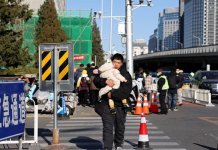“Planned attacks carried out by two to three terrorist organisations,” says Mohsin Naqvi
Faisal Sheikh
ISLAMABAD: Minister for Interior Mohsin Naqvi on Friday said that the horrific attacks in Balochistan, wherein dozens including security personnel lost their lives, was a “plot to subvert” upcoming Shanghai Cooperation Organisation (SCO) summit to be hosted by Pakistan next month.
Balochistan, on August 26, faced a series of horrific attacks that resulted in over 50 deaths, including 14 security personnel, as militants affiliated with the banned Balochistan Liberation Army (BLA) targeted civilians, police, and security forces.
In one of the deadliest attacks, at least 23 passengers were killed after being offloaded from passenger buses and trucks in the Rarasham area of Balochistan’s Musakhel.
Separately, at least 10 people, including police and Levies personnel, were martyred in a gun attack in Kalat.
Furthermore, at least 14 brave sons of soil, including 10 security forces soldiers and four personnel of law enforcement agencies (LEAs), were martyred in clearance operations, wherein at least 21 militants were neutralised.
Amid the latest terror incidents, Pakistan is set to host SCO Council of Heads of Government (CHG) meeting from October 15-16.
In this regard, Islamabad extended invitations to all heads of government of the member states, including Indian Prime Minister Narendra Modi despite strained ties.
Speaking on the floor of the Senate today, the interior minister said that the “completely-planned” Balochistan attacks were carried out by “two to three terrorist organisations”.
“A lot of people are in anguish as they don’t want Pakistan to host the [SCO] meeting,” he said, adding that the August 26 incident was a “conspiracy to sabotage the summit”.
Naqvi further said that no operation was being launched in Balochistan while “stringent action would be taken against those who did not accept the state and took up arms”.
He also said that the apex committee reviewed the decisions related to the National Action Plan (NAP) and coordinated with the federal and provincial institutions, adding: “Parliament is supreme and will remain supreme.”

















